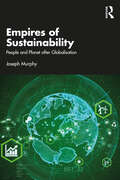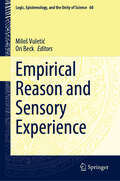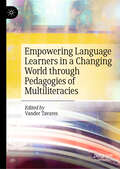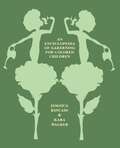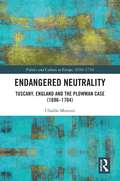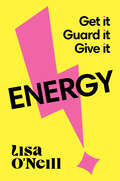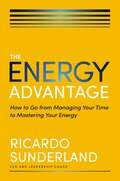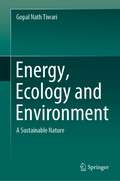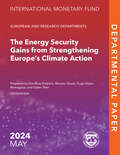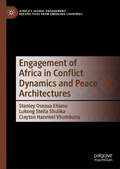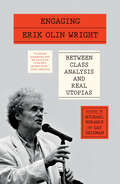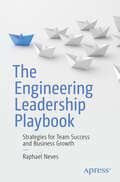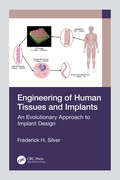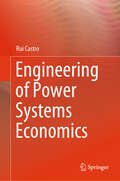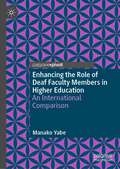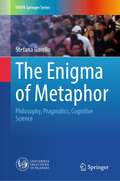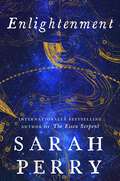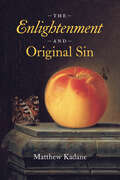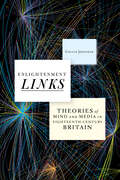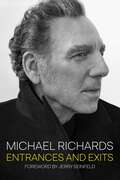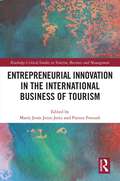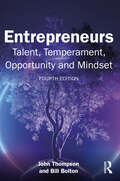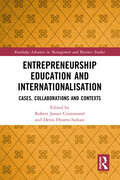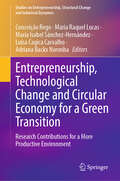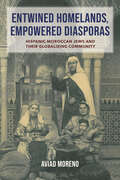- Table View
- List View
Empires of Sustainability: People and Planet after Globalisation
by Joseph MurphyFocussing on the greening of imperialisms and empires, Empires of Sustainability analyses the shift around the world from denial of the environmental crisis to action to prevent catastrophe, and the resulting implications.Evidence of this shift is clear in widespread and purposeful social change which is gathering momentum. The book explains how globalisation accelerated us towards the crisis, and today, even as its own legitimacy is being questioned, is evolving through solutions and responses to it. Looking ahead and as the environmental crisis worsens, two possible futures are discerned and explored. One is that through universal actions to save the planet, shaped by interweaving political and economic forces, the hegemony of globalisation is restored, albeit in a green form. The other is that the world reorganises into competing spheres of influence, with politics, economics and the environment interwoven differently in each case. In these ways, we face the prospect of one or more Empires of Sustainability emerging over the decades ahead, unless we build a better alternative society. The author presents an alternative: a more diverse World of Caring Places.This accessible book will appeal to students and scholars of international political economy, sustainability and environmental studies, and analysts, policy makers, campaigners and others concerned about the future of relations between people and planet.
Empirical Reason and Sensory Experience (Logic, Epistemology, and the Unity of Science #60)
by Miloš Vuletić Ori BeckThe volume offers a lively and wide-ranging debate on the major questions of perceptual epistemology, including how perceptual experiences can bestow positive epistemic standing to empirical judgments and beliefs; the relative epistemic import of veridical and non-veridical perceptual experiences; the relation between experience and knowledge; and the nature of experience in view of its epistemic linkages to discursive contents. The volume is centered around five cutting-edge essays by leading authors in these areas—Anil Gupta, Andrea Kern, Christopher Peacocke, Susanna Schellenberg and Crispin Wright—along with no less than thirty contributions scrutinizing and critically discussing the essays, prompting detailed rejoinders from the lead authors. The volume closes with an extensive debate between Annalisa Coliva, Gupta and Wright. Taken as a whole, the volume covers much ground in epistemology of perception and displays a variety of approaches and perspectives through fruitful and accessible exchanges. It will be of interest not only to researchers working in perceptual epistemology but also to students new to the subject.
Empowering Language Learners in a Changing World through Pedagogies of Multiliteracies
by Vander TavaresThis book presents conceptual and empirical studies on how pedagogies of multiliteracies can empower language learners, teachers, and teacher educators in an increasingly globalized yet unequal world, with a focus on social justice in language education. The chapters offer critical and innovative pedagogical insights that contribute to re-envisioning language and literacy education in the 21st century in a number of educational contexts, including post-secondary, community, refugee, science, language, and teacher education. From a raciolinguistic critique of monoglossic education in the United States to drama-based pedagogies for refugee learners in Iceland, this book contextualizes language learner empowerment by identifying and confronting ideologies of race, gender, nationality, and language. Creative multimodal and multisensorial pedagogies are enacted through learner-designed plurilingual portfolios, infographics, picturebooks, identity texts, performance, andmuseum-based learning. This book diversifies and enriches current approaches to language education based on pedagogies of multiliteracies that cultivate learner agency, identity, and critical reflection, and it will be of interest to readers with backgrounds in second/foreign language education, TESOL/ESL, sociology of education, and applied linguistics.
An Encyclopedia of Gardening for Colored Children
by Jamaica KincaidA unique collaboration from two of America’s leading artists that explores the fascinating and hidden history of the plant world.In this witty, deeply original book, the renowned novelist Jamaica Kincaid offers an ABC of the plants that define our world and reveals the often brutal history behind them.Kara Walker, one of America’s greatest visual artists, illustrates each entry with provocative, brilliant, enthralling, many-layered watercolors.There has never been a book like An Encyclopedia of Gardening for Colored Children—so inventive, surprising, and telling about what our gardens reveal.
Endangered Neutrality: Tuscany, England and the Plowman Case (1696–1704) (ISSN)
by Ubaldo MorozziAnalysing a struggle for neutrality amid a rapidly changing European scene, this book illustrates how the small state of Tuscany cunningly managed to preserve its sovereignty and independence during a dangerous diplomatic dispute with England.Endangered Neutrality follows the actions of William Plowman (1660-?), who sparked the dispute, and those of two of the main characters of the story, Iacopo Giraldi (1663-1738), Tuscan ambassador to England, and Lambert Blackwell (d.1727), English envoy to Tuscany. Through these privileged points of view, the reader is plunged into the highest levels of European politics and diplomacy of the period.This book offers a radically new approach to the study of Tuscan history, particularly in relation to the reign of Cosimo III de’ Medici. It underlines the weakness of the concept of the ‘small state’, showing how Tuscany managed openly to confront a much more powerful country such as England. Tuscany built a ‘system of neutrality’ which, leveraging the economic importance of the Mediterranean trade routes and of the port of Livorno, allowed the Grand Duchy to preserve its independence. Analysis of the case also offers a unique perspective on the functioning of the Tuscan and English diplomatic corps, assessing the impact of the Glorious Revolution on English diplomatic capabilities. Special attention is devoted to the importance of symbolism in diplomatic practice and to the role of trade and public opinion in resolving international disputes.
Energy: Get It, Guard It, Give It
by Lisa O'NeillTaking responsibility for your energy can change your life. Good decision to look me up. I love that you're curious! Do you ever meet people and say to yourself 'I wish I had their energy'? Instead, you're feeling completely exhausted, unmotivated – frankly, a little flat. Well, it's time to take back control. You are responsible for your energy. You need to understand what (and who) depletes your energy levels and find ways to recharge. That's where I come in! I'm brimming with ideas, information and actionable tips that will positively impact your energy instantly. Energy is physical, emotional, mental, spiritual – it's everything! I'll teach you how to get it, guard it and give it, and how you can improve how you feel, how you perform and how you're received. I'm so glad we found each other. You were wandering around looking for something to improve your life and BOOM, I show up! It's a sign. I like you. I think we're going to get along great. And, given that we are already friends, I think it's time for you to buy me so that I can start changing your life. Come on, what are you waiting for? Let's go!
The Energy Advantage: How to Go from Managing Your Time to Mastering Your Energy
by Ricardo SunderlandHow do you maximize your success and impact as a leader while maintaining your stamina and sanity? The answer doesn&’t lie in simple &“efficiency.&” It&’s not about making better use of your time and resources. It&’s about understanding how energy works and how to tap into its power.Many people live lives of intense, and false, emotional compartmentalization. For example, they strive to be one person in the corner office (invincible warrior) and another person at the dinner table (sensitive spouse), and they struggle to keep those two lives from bleeding into and contradicting each other. But as it turns out, this takes a tremendous amount of energy and is almost always impossible. One person can&’t be two different people.So how do you live an integrated life of fulfillment, purpose, and success? How do you create an alignment between head, heart, and the creative power that is in coherence with your true self? The answer is both simple and complex: You need to move from managing your time to mastering your energy.For more than a decade and a half, Ricardo Sunderland has worked with the leaders of some of the largest and most recognizable companies in the world. He has learned firsthand that for today&’s leaders—at all levels in their organizations—mental and physical energy are no longer all you need for success. Today&’s leaders must bring emotional and spiritual energy to their roles and create a space in which both they and their team members feel safe to challenge each other, grow together, and thrive.Given this major leadership challenge, leaders must gain the energy advantage.You will learn:What gives you energy.How to identify the energy blockers that are holding you back.That every situation presents a choice for you to unlock the transformational source of energy within you.The path to gaining the energy advantage on seven distinct levels.
Energy, Ecology and Environment: A Sustainable Nature
by Gopal Nath TiwariThis book covers topics related to climate change, weather, greenhouse effect, solar energy, various cycles including carbon, hydraulic, sulphur, renewable energy conservation, ecology and sustainable environment. The contents of the book include pedagogical elements, such as exercises, tables and figures at appropriate places in each chapter, including problems and objective questions at end of each chapter, to aid in learning. Further, the unit conversion from FPS system to SI unit of each parameter, namely length, energy, power, velocity and pressure force, etc, and some standard constants used in examples are also provided in the book. The book also includes discussion about renewable energy sources, namely solar energy, wind energy, biomass energy and geothermal energy, etc, their availability and eco-friendly nature. This book can be a useful reference for those in academia and industry.
The Energy Security Gains from Strengthening Europe’s Climate Action (Departmental Papers)
by SherA report from the International Monetary Fund.
Engagement of Africa in Conflict Dynamics and Peace Architectures (Africa's Global Engagement: Perspectives from Emerging Countries)
by Stanley Osezua Ehiane Lukong Stella Shulika Clayton Hazvinei VhumbunuThis book examines the nature of conflict in Africa vis-à-vis the African Union (AU) peace and security architecture in Africa. It focuses on the intense campaign ‘Silencing the Guns by 2020’ since 2013, one of the flagship projects of Agenda 2063 to achieve a conflict-free continent by AU. It analyses various causes of conflict in Africa using case studies to pursue the causality and dynamics of these conflicts, which often point to the intersectionality of historical legacies of colonialism and neo-colonialism. It further examines the interplay of factors such as resource curse, resource exploitation, election-induced violence, political violence, incessant and interminable challenges of social justice, oppression, contemporary governance, and leadership dynamics. It also focuses on the application and integration of conflict and gender for analytical reflection. In the quest for a “Peaceful and secure Africa”, this book examines the different mechanisms to prevent, manage, and resolve conflicts on the continent, and the challenges thereof. It probes and investigates by asking critical questions about continental conflict dynamics and peace architectures which warrants in-depth inquiry and interrogation.
Engaging Erik Olin Wright: Between Class Analysis and Real Utopias
by Michael Burawoy and Gay SeidmanA collection of essays exploring emancipatory social science, inspired by the work of pioneering sociologist Erik Olin WrightErik Olin Wright was one of the most brilliant and world renowned social scientists of our era. He left us in 2019 with an unfinished project - the articulation of class and utopia. Wright's sociological Marxism embarked from an original class analysis, with its trade-mark contradictory class locations, that empirically mapped class structures across the globe. In response to the collapse of communism and the rise of neoliberalism, Wright turned to the premise of class analysis, that is the possibility of socialism.Forsaking Marxism's allergy to utopian thinking, Wright searched the planet for institutions that might sow the seeds of socialism – such as cooperatives, participatory budgeting, basic income grants – institutions that might dissolve racial, gender, and class inequalities by eroding capitalism. His last book How to be an Anticapitalist in the Twenty-First Century, published posthumously in over a dozen languages has become a manifesto for a new world, bringing together and inspiring social movement activists.The essays in this volume pay tribute to his generative theory, his crystalline teaching and his personal warmth. The authors – all close colleagues or former students – wrestle with the relationship between his two expanding research programs, class analysis and real utopias. They burn the candle from either end, all galvanized by Wright's genius and vision to reinvent Marxism.
The Engineering Leadership Playbook: Strategies for Team Success and Business Growth
by Raphael NevesIn today's business landscape, software engineering teams must deliver innovation faster than ever. However, outdated management approaches centered on tools and metrics rather than people strangle velocity and creativity. Legacy leaders cling to rigid structures mismatched with market dynamics, draining effort and morale from burnt-out teams. The Engineering Leadership Playbook provides a modern framework to unlock your team's potential through empathy, clarity, and empowerment. Unlike traditional leadership books fixated on delivery metrics, Raphael Neves offers a refreshing people-oriented leadership model tailored to nuances of engineering culture. With 15+ years leading high-growth tech teams, Raphael demystifies how to balance autonomy with alignment, reconstruct feedback models on psychological safety, and sustain excellence amidst uncertainty. You'll learn his proven conflict resolution blueprint for defusing clashes through mutual understanding while tangibly tracking progress. Additionally, his continuous feedback system grounded in evidence spotlights gaps early while accelerating strengths. This playbook moves systematically from foundational concepts like emotional intelligence and leading by example into team development frameworks around high-impact coaching, mentorship, and performance reviews. The method is brought full circle through innovation catalysts that maintain creative momentum at scale. Step-by-step, Raphael unpacks human-centered leadership aligned with accelerating market realities. Apply his engineering management playbook, and your teams will thrive fueled by vision, trust, and care. What You'll Learn Study different leadership styles and how to switch their approaches depending on circumstances Review critical communication skills, especially in technical fields Create IDPs for team members, especially senior engineers and leaders Who This Book Is For Current engineering leaders, aspiring engineering leaders, senior engineers, HR professionals and recruiters, and professionals in related fields
Engineering of Human Tissues and Implants: An Evolutionary Approach to Implant Design
by Frederick H. SilverThis text presents information on biological control systems, mechanotransduction, tissue structure, and function, as well as properties that can be integrated together to provide improved implant and device designs. This information is needed to develop new diagnostic tests and instruments that provide early diagnostic tests and treatments for diseases.Engineering of Human Tissues and Implants: An Evolutionary Approach to Implant Design provides basic scientific information on the evolutionary design of tissues and organs that are a result of living in a gravitational field. Much of the useful information that is available for the design of implants is based on tissue structure and function derived from light and electron microscopy observations. However, this information is not enough for developing new designs of implants and medical devices since much of the biological response to implants is based on understanding the biological control systems and mechanotransduction that drive many of the responses seen with implanted devices. The book also introduces mechanotransduction as it relates to implant design with an overview of materials and their use in applications that include those materials designed to treat wounds, burns, facial, hernial, ophthalmic, oral, cardiovascular, and tendon/ligaments.This book is intended for biomedical science and engineering students who are learning about artificial implants and medical device development. It will also be of significance to other engineering majors interested in the design of devices for diagnoses and measuring of physiological parameters, as well as to clinicians and researchers who are interested in mechanobiology.
Engineering of Power Systems Economics
by Rui CastroThis textbook is a comprehensive resource designed for university master's students on power systems, with a focus on engineering-related aspects. It covers all the fundamental principles of power systems economics.PhD students seeking to enhance their understanding of power systems economics from an engineering standpoint will also benefit from this book. It offers in-depth analysis and detailed insights into economic engineering aspects, presenting various models that are meticulously explained.Furthermore, practising engineers from all disciplines will find this book useful as it provides practical solutions to real-world engineering issues. Through worked examples and solved problems derived from existing installations, professionals can apply the knowledge gained in their everyday work. From a broader perspective, the book caters to the growing number of individuals interested in the economics of power systems, whether driven by professional obligations or self-education.What sets this book apart from existing literature is its unique approach, establishing a strong connection between economics and engineering. Unlike traditional texts that predominantly focus on economic theory, this book bridges the gap by offering practical applications within the power system context. The first part looks into classic economic theory, exploring subjects such as producers and consumers, market behavior, and general market structures, always with a clear connection to power systems. Numerous examples from the power system industry enrich the learning experience. In the second part, the theory presented in the first section is applied to power system-specific problems. These include an in-depth examination of different costs in power systems, regulation strategies, and the intricacies of electricity markets.Overall, this book provides a valuable resource for universitystudents, PhD candidates, and engineers alike, offering a unique blend of economic theory and engineering applications.
Enhancing the Role of Deaf Faculty Members in Higher Education: An International Comparison
by Manako YabeThis book is based on an international, mixed methods research project that conducted interviews with 25 deaf or hard-of-hearing (DHH) faculty members from mainstream universities and 19 university students who took classes taught by DHH faculty members and collected surveys from 57 DHH faculty members and 104 university students worldwide. The author reports on their experiences of accessibility at their institutions and makes recommendations based on the findings. The book will serve as a user guide or supplemental text for DHH faculty members, researchers, students, and academic interpreters, as well as university administrators and disability service directors who are looking to improve disability provision at their institutions.
The Enigma of Metaphor: Philosophy, Pragmatics, Cognitive Science (UNIPA Springer Series)
by Stefana GarelloThis book deals with the complicated realm of metaphor, an enigma deeply embedded in language and cognition. There has been much discussion of metaphor in the past, but it was characterized by a certain fragmentation and lacked interdisciplinarity. In this field of study, the dominance of Cognitive Linguistics, epitomized by the Conceptual Metaphor Theory of George Lakoff and Mark Johnson, has caused the marginalization of alternative perspectives. To fill this gap, this book embarks on an interdisciplinary journey, inviting different theoretical frameworks to engage in a fruitful dialog. It navigates the labyrinth of theories and illuminates the nuanced facets of metaphor.At the center of this exploration are three central questions: whether metaphor belongs to the realm of style or thought, the intricate interplays between literal and metaphorical meanings and the integration of propositional and non-propositional elements in the construction of metaphorical meaning.Through a careful blend of historical analysis and contemporary hypotheses, the book unravels the complexities of metaphor, considering its evolution across the centuries and the myriad interpretations it evokes. By bringing together work from different fields, it ultimately shows that a definition of metaphor is theory-dependent and that metaphor is not a natural kind, but a complex and multifaceted philosophical concept whose study requires a multi-dimensional approach that transcends narrow theoretical boundaries. In this way, the book explores these considerations’ most important philosophical consequences and offers new insights into this fundamental aspect of human language.
Enlightenment: A Novel
by Sarah Perry“Like A.S. Byatt’s Possession, Enlightenment is a baroque, genre-bending novel of ideas, ghosts and hidden histories. A richly layered epic....a heartfelt paean to the consolations of the sublime, where religion and science meet." -- Telegraph"Read it, then read it again. This is a book full of unexpected wonders." -- Literary ReviewFrom the author of The Essex Serpent, a dazzling novel of love and astronomy told over the course of twenty years through the lives of two improbable best friends.Thomas Hart and Grace Macaulay have lived all their lives in the small Essex town of Aldleigh. Though separated in age by three decades, the pair are kindred spirits—torn between their commitment to religion and their desire to explore the world beyond their small Baptist community.It is two romantic relationships that will rend their friendship, and in the wake of this rupture, Thomas develops an obsession with a vanished nineteenth-century astronomer said to haunt a nearby manor, and Grace flees Aldleigh entirely for London. Over the course of twenty years, by coincidence and design, Thomas and Grace will find their lives brought back into orbit as the mystery of the vanished astronomer unfolds into a devastating tale of love and scientific pursuit. Thomas and Grace will ask themselves what it means to love and be loved, what is fixed and what is mutable, how much of our fate is predestined and written in the stars, and whether they can find their way back to each other.A thrillingly ambitious novel of friendship, faith, and unrequited love, rich in symmetry and symbolism, Enlightenment is a shimmering wonder of a book and Sarah Perry’s finest work to date.
The Enlightenment and Original Sin (The Life of Ideas)
by Matthew KadaneAn eloquent microhistory that argues for the centrality of the doctrine of original sin to the Enlightenment. What was the Enlightenment? This question has been endlessly debated. In The Enlightenment and Original Sin, historian Matthew Kadane advances the bold claim that the Enlightenment is best defined through what it set out to accomplish, which was nothing short of rethinking the meaning of human nature. Kadane argues that this project centered around the doctrine of original sin and, ultimately, its rejection, signaling the radical notion that an inherently flawed nature can be overcome by human means. Kadane explores this and other wide-ranging themes through the story of a previously unknown figure, Pentecost Barker, an eighteenth-century purser and wine merchant. By examining Barker’s personal diary and extensive correspondence with a Unitarian minister, Kadane tracks the transformation of Barker’s consciousness from a Puritan to an Enlightenment outlook, revealing through one man’s journey the large-scale shifts in self-understanding whose philosophical reverberations have shaped debates on human nature for centuries.
Enlightenment Links: Theories of Mind and Media in Eighteenth-Century Britain (Stanford Text Technologies)
by Collin JenningsIn this ambitious work, Collin Jennings applies computational methods to eighteenth-century fiction, history, and poetry to reveal the nonlinear courses of reading they produce. Hallmark genres of the British Enlightenment, such as the novel and the stadial history, are typically viewed as narratives of linear progress, emerging from Britain's imperial growth and scientific advancement. Jennings foregrounds Enlightenment links: the paratextual devices, including cross-references, footnotes, and epigraphs, that make words work differently by pointing the reader to places inside and outside the text. Writers and printers combined text and paratext to produce nonlinear paths of reading and polysemous forms of reference that resist simple, causal structures of experience or theories of mind. Alexander Pope, Adam Smith, Ann Radcliffe, and other writers developed genres that operate diagrammatically, with different points of entry and varied relationships between the language and format of books. Revealing the eighteenth-century genealogy of the digital hyperlinks of today, Enlightenment Links argues that emergent print genres combined language and links to bring forward the associative, circular, and multi-sequential ways in which literature makes language work.
Entrances and Exits
by Michael RichardsThe man who brought the kavorka to the Seinfeld show through one of the most remarkable and beloved television characters ever invented, Kramer, shares the extraordinary life of a comedy genius—the way he came into himself as an artist, the ups and downs as a human being, the road he has traveled in search of understanding.&“The hair, so essential, symbolizes the irrational that was and is and always will be the underlying feature not only of Kramer but of comedy itself. This seemingly senseless spirit has been coursing through me since childhood. I&’ve been under its almighty influence since the day I came into this world. I felt it all within myself, especially the physical comedy, the body movements, so freakish and undignified, where I bumped into things, knocked stuff down, messed up situations, and often ended up on my ass. &“This book is a hymn to the irrational, the senseless spirit that breaks the whole into pieces, a reflection on the seemingly absurd difficulties that intrude upon us all. It&’s Harpo Marx turning us about, shaking up my plans, throwing me for a loop. Upset and turmoil is with us all the time. It&’s at the basis of comedy. It&’s the pratfall we all take. It&’s the unavoidable mistake we didn&’t expect. It&’s everywhere I go. It&’s in the way that I am, both light and dark, good and not-so-good. It&’s my life.&” —Michael Richards, from Entrances and Exits
Entrepreneurial Innovation in the International Business of Tourism (Routledge Critical Studies in Tourism, Business and Management)
by Pantea Foroudi María Jesús Jerez-JerezThis international case study book provides 28 expertly curated case studies on entrepreneurship and innovation in tourism, each with detailed implementation instructions for the instructor to maximise student participation and learning.The dynamic characteristic of the tourism industry under the influence of micro and macro environment factors requires future professionals to be equipped with appropriate skills and competencies to deal with change and development in real-life practices. Curated and developed by industry experts and practitioners, these case studies embody real-world scenarios with the aim of best preparing students for their future careers. This compelling set of case studies explores the dynamics of entrepreneurship in global context, analyses emerging markets and new business models, and elicits the implications of innovation and entrepreneurship in different contexts and within a transdisciplinary perspective. The cases illustrate innovation and entrepreneurship as an accelerator of tourism growth and development, under a sustainable perspective.With reflective questions throughout to aid both in-class discussion and self-study, this book is an ideal study resource for use in higher and vocational education, and its unique, teaching-led approach positions it as a vital study tool for instructors and students alike.
Entrepreneurs: Talent, Temperament, Opportunity and Mindset
by John Thompson Bill BoltonWhat does it take to be – or to become – a successful entrepreneur? Are there specific personality types that are best suited to entrepreneurship? And can these types, or rather the attributes that combine to forge them, be learned or acquired? In this book, John Thompson answers these questions – and many more – to let the reader see through the eyes of the entrepreneur. Entrepreneurs: Talent, Temperament, Opportunity and Mindset introduces the world of entrepreneurship from a person-centred perspective. Part 1 builds an understanding of the entrepreneur as a person based on the key factors of talent and temperament – a unique framework for understanding and exploiting entrepreneurial opportunities. Part 1 also explores the entrepreneurial mindset and how it can be honed and strengthened. The process of starting and growing a business is then described in detail in Part 2, which also examines entrepreneurship in the context of opportunity and strategy. Part 3 introduces the infrastructure and environment in which the entrepreneur has to operate and tells the stories of famous entrepreneurs through dozens of case vignettes, including classic figures such as Henry Ford, through to social entrepreneurs and even anti-social entrepreneurs such as Al Capone! This insightful, empirically-based take on the entrepreneur provides students with an accessible and original way into entrepreneurship. Whatever their background, students at all levels will value the author’s accessible writing style and invaluable insights.
Entrepreneurship Education and Internationalisation: Cases, Collaborations and Contexts (ISSN)
by Denis Hyams-Ssekasi Robert James CrammondEntrepreneurship Education and Internationalisation: Cases, Collaborations and Contexts provides a wide-ranging overview of entrepreneurship education today from a global perspective. Comprising three parts that address teaching and learning, support and outcomes, and strategic themes, international educators and researchers present examples of entrepreneurship education in action within many contexts. Chapters discuss across many academic fields and taught disciplines, involving many industry stakeholders concerning enterprise and business creation and development, and acknowledge policy and policymakers within local, national, and international government or educational forums.Chapters showcased within this edited book range from collaborative teaching case studies, course teaching styles and assessment strategies, and display links with national or international industry partners. Furthermore, incubation opportunities, examples of accelerator and university start-ups or spinouts, cross-continent partnerships for entrepreneurship, and other relevant enterprising activity between universities and industry or societal groups are also examined and appreciated.
Entrepreneurship, Technological Change and Circular Economy for a Green Transition: Research Contributions for a More Productive Environment (Studies on Entrepreneurship, Structural Change and Industrial Dynamics)
by Conceição Rego Maria Raquel Lucas María Isabel Sánchez-Hernández Luísa Cagica Carvalho Adriana Backx NoronhaThis book is a comprehensive and timely publication that aims to be an essential reference source, building on contemporary research in the fields of circular economy and green transition in relation to entrepreneurship and technological change. This book aims to address a range of approaches including, but not limited to, the conceptual, theoretical, and case studies related to the topics of the book. The topical focus is on how circular economy contributions, energy infrastructure, green transition, and digital transformation are contributing to attaining the Sustainable Development Goals (SDGs). The expert contributions in the book particularly help us learn more about the answers to the current challenges of the green transition as well as how the necessary technological change will impact, mainly, the enterprises and the field of agriculture production and agribusiness. The book is mainly intended to support an academic audience (academics, university teachers, researchers, and post-graduate students – both Master's and Doctorate levels). In addition, this book will be of benefit to institutional experts, developers, and researchers in the fields of Entrepreneurship and technological change in circular economy and green transition.
Entwined Homelands, Empowered Diasporas: Hispanic Moroccan Jews and Their Globalizing Community (Sephardi and Mizrahi Studies)
by Aviad MorenoEntwined Homelands, Empowered Diasporas explores how the 30,000 Jews in northern Morocco developed a sense of kinship with modern Spain, medieval Sepharad, and the broader Hispanophone world that was unlike anything experienced elsewhere. The Hispanic Moroccan Jewish diaspora, as this group is often called by its scholars and its community leaders, also became one of the most mobile and globally dispersed North African groups in the twentieth century, with major hubs in Venezuela, Argentina, Brazil, Peru, Spain, Israel, Canada, France, and the US, among others.Drawing on an array of communal sources from across this diaspora, Aviad Moreno explores how narratives of ancestry in Spain, Israel, Morocco, and several Latin American countries interconnected the diaspora, empowering its hubs across the globe throughout the twentieth century and beyond.By investigating these mechanisms of diaspora formation in a small community that once shared the same space in Morocco,Entwined Homelands, Empowered Diasporas challenges national accounts of the broader Jewish diasporas and adds complexity to the annals of multilayered ethnic communities on the move.
